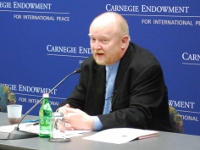Registration
Thank you!
You will receive an email confirming your registration.
IMGXYZ2323IMGZYXIncreasingly, the North Caucasus looks and feels more like Russia’s neighbor than a constituent part of the state. Moscow and some areas refer to North Caucasus as Russia’s “internal abroad.” Alexey Malashenko of the Carnegie Moscow Center gave an overview of the current situation in Russia’s North Caucasus Region and emphasized that the rapid Islamization of the region is a potential source of problems for Russia and beyond.
Malashenko started with the overview of the economic situation of the region which he described as extremely poor and still deteriorating. He noted:
- The absence of reliable information about real development figures, about how the republics are run and how the budgets get allocated. This poses a major challenge in assessing the economic situation in the region.
- Dependence on allocations from Moscow. The republics are fully financed by the federal budget of Russia; and they are demanding increased allocations because they believe the Kremlin “owes it them” as it initiated two wars in the North Caucasus in 1994 and 1999, wiping out most of the infrastructure in the region. Today, the republics could not survive without the money from Moscow.
- Extremely high unemployment which exacerbates the socio-economic situation. Ingushetia’s unemployment is 50 percent, Chechnya’s 35 percent, and despite Dagestan’s official figure of 13.5 percent, it is unofficially estimated to be around 30 percent.
At the same time, the Kremlin refuses to recognize its responsibility to address the myriad of problems of the region. Nominally governed by federal law, in fact the region lives by its own “laws,” which are usually represented by local preachers who largely acceded to high-level and oftentimes corrupt local officials (presidents of republics and their ministers). Most people living in the North Caucasus region are focused on survival, and there is a huge disappointment with the Kremlin leaders and with their “puppets” who serve locally.
Malashenko said that, due to despair and disappointment, more and more people turn to tradition, to Islam, to fill in their sense of emptiness. The speed of Islamization is shocking, even faster than what is occurring in Central Asia. The popularity of Sharia’ law is growing, so much so that the rule by Sharia’ law appears as a logical next step.
He went on to argue that, if rapid Islamization continues, if Russia’s borders remain unchanged, some republics of the North Caucasus could be transformed into zones for radical Islam. The spread of Islamic inspired ideologies can create problems for Russia and for others as well. That is why we need to think through the problems that this may pose, or we will be caught by surprise by its consequences.
